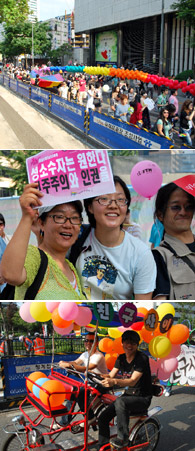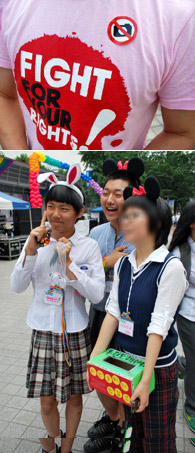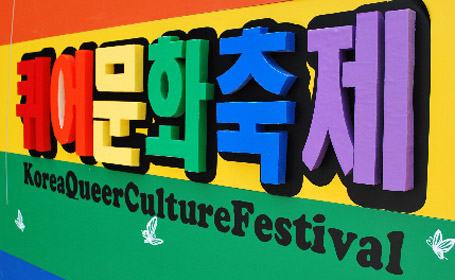On Saturday, an estimated 1,500 people marched along the Cheonggye Stream in downtown Seoul. The main event of the 10th annual Korea Queer Culture Festival (KQCF) marked South Korea's largest-ever celebration of homosexuality. The procession was led by a troupe of pungmul folk musicians and three trucks outfitted with rainbow flags, dance platforms and speakers playing Korean pop. Locals wearing "God made Queer" buttons marched with foreign English teachers and teen boys donning mouse ears and pleated skirts.

Queer pioneers
In the years following Japanese occupation and civil war, military dictatorships suppressed social organising across South Korea. Although tiny bars in Seoul's Jongno neighbourhood have catered to gay clients for decades, it wasn't until 1993 that the country's first queer rights group, Chodonghwae, was founded. Two years later, the first campus group, Come Together, formed at Yonsei University.
According to Jun Dong-beom, the 2009 SeLFF Programmer, members of those early groups were inspired by events abroad. "In the early 1990s there were some [LGBT organisations] at Korean universities and they saw there were many pride parades and festivals in other countries. So at the time the college students and some gay and lesbian activists started planning to have our own parade."
In 1997, Come Together founder, Seo Dong-jin, organised what was to be South Korea's first queer film festival. But on opening day, local government officials cut off the theatre’s electricity and threatened organisers with fines and lengthy jail sentences. Despite attempts to thwart the festival again in 1998, in November, the first Seoul Queer Film and Video Festival was convened at the Artsonje Center.
Jun, who helped organise the inaugural festival, says that despite a positive reception, the event bankrupted the group. In 2000, the first KQCF, a two-day event called "Mujigae (Rainbow) 2000" was established by merging a film festival with a parade and dance party. At that first-ever march, 50 people walked through Seoul's Daehangno neighbourhood.
Express your-SeLFF
Something probably unthinkable in 2000 was that in less than ten years, Choi Hyun-sook would become South Korea’s first openly lesbian candidate for National Assembly. Choi, 52, who was among the marchers on Saturday, is the subject of, The Time of Our Lives, a film documenting her unsuccessful 2008 election campaign.
Directed by Hong Ji-yoo and Han Yeong-hee, the film was among 29 screened during the five-day Seoul LGBT Film Festival (SeLFF), Korea's only queer film festival. Other screenings featured Le Nouveau Monde (The New World), a quirky movie about lesbian motherhood in the Paris suburbs, and Takumi-kun: June Pride, a humorous adaptation of the Japanese "BL" or "boys' love" novel by Shinobu Gotoh.
Despite a decade of pride festivals on the Korean Peninsula, only a handful of Korea’s queers participate in events like the SeLFF and parade. And even among those who did last weekend, a desire to stay firmly in the closet was visible on many faces – literally. About half of the people perusing the festival’s information booths wore stickers of a camera inside a red slashed circle on their cheeks or chests. Media had to sign a form promising to refrain from photographing marked individuals.

"I'm torn because you're at a gay pride parade, so the whole point is to be visible…, but on the other hand there are repercussions and they could lose family members... so I understand, but it's sad it has to be this way." He added, "...In the end they're here and they want to be here… Maybe one day they don't have to wear those stickers."
Korea's Rainbow Teens
For members of the queer youth group, Rateen (Rainbow Teen), that day may have already arrived. As part of the pre-parade entertainment, the crowd cheered as eight youngsters in white oxford shirts, blank pants and ties performed a racy dance on stage.
Founded in January 2007 by two teens who go by the nicknames "Chingy" and "Roosky," Rateen encourages Korean teens to come out of the closet through informal peer counseling. Although the 2,000-member organisation is focused on LGBT youth, 17-year-old Roosky Lee says that anyone interested in learning about queer youth culture can join.
In fact, Lee says his group helps older Koreans who came of age in a less open era. "[A] lot of Koreans just believe that gays don't exist in Korea, so many of the people, even though they are gay, they really don't know about their sexual identity."
Describing a “really old” 49-year-old man who left a meeting thinking he might be gay, Lee adds, "... sometimes through our community [older people] just come and they start to realise their sexual identities. So I think we've kind of helped them."
Although he co-founded a group that encourages Koreans to come out of the closet, Lee isn't out to his parents yet. "I really wanted to say that I'm gay to my parents but then they just don't seem to understand what I'm saying," he says. Although his parents are proud of him for co-founding Rateen, a fact he freely shared with them, he thinks they interpret "supporting sexual minorities" to mean that he doesn't have sex.
In September, Lee will start college in the San Francisco Bay Area, where he looks forward to a more open LGBT community where he hopes to find a boyfriend. In the meantime, he says he needs to be "more courageous" and plans to come out to his parents "very soon."
Is the party over?
An Asia representative of the International Lesbian and Gay Association (ILGA) who asked to be identified only by his nickname "Joong," said he was impressed by this year's KQCF. A native of Mongolia, he has been to many pride events around the world and was surprised by the reception of non-queer Koreans. "Korea is a conservative country, but compared with other Asian countries like Iran... Mongolia and China [there's] not much stigma [against sexual minorities]."
A woman who happened upon the parade with a friend seems to support Joong’s claim. "Actually, I'm very happy to see [a] gay parade here because it seems like Korea is changing, right? It's global... so I'm happy to see that."
Despite positive reviews, not everyone is optimistic about the KQCF’s future. Describing South Korea's president, Lee Myung-bak, as "very homophobic," Han Chae-yoon, who has helped organise the event since its inception, says that funding insecurity and a hostile political environment threaten its feasibility.
In a 2007 interview with a major national newspaper, Lee - who was then a contender in the presidential race - was quoted as saying that he thought homosexuality to be abnormal and the only “normal” union is between a man and woman.
According to SeLFF Programmer Jun, the festival's 2009 budget was cut by half, from 30 million won in 2008 (about US$24,000) to just 15 million this year.
A long-time and significant source of support is the Korean Film Council (KOFIC), which provided 7 million won for this year's film series. By the end of June, organisers expect to know what KOFIC will allocate for next year. Jun says the 2010 film festival will be cancelled if the grant falls short.
Although most Korean queers admit that South Korean attitudes about homosexuality have improved considerably over the past ten years, LGBT activists like Han insist that fundamental challenges persist. "Ten years ago [LGBT Koreans] were afraid to express their sexual identities. Now, the community has grown, yet we still don't have our rights and we can't live our lives outside of the closet. These problems remain."
(Note: On June 20-21, the southern city of Daegu will host the Daegu Gyeongbok Queer Culture Festival, the first time KQCF has expanded outside Seoul. Special thanks to Kahlo for interpretation assistance.)
Matt Kelley is a Seoul-based writer who typically covers race, sexuality and/or travel. His website: www.mattkelley.info.












 Printable Version
Printable Version













Reader's Comments
Please log in to use this feature.